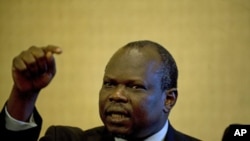Sudan and South Sudan have opened another round of talks on oil revenues and other contentious issues with harsh words and dampened expectations. Both sides appear to be holding to hard-line positions.
South Sudan's chief negotiator Pagan Amum went into the opening session Tuesday of 10 days of African Union-mediated talks accusing Khartoum of hostile acts on the ground even as it negotiates in Addis Ababa.
"We are concerned the government of Sudan is beating the drums of war. They are mobilizing, according to them, to wage war against South Sudan. That is what the leadership of the government of Sudan are engaged in today as we speak," said Amum.
Seemingly intractable positions
Amum spoke as word arrived of fresh clashes along the loosely defined border. The United Nations refugee agency quoted new arrivals at camps in South Sudan as saying they were fleeing because of aerial bombardment and the fear of fresh violence.
Southern negotiator Amum told VOA he had not seen any positive development since the last round of talks ended in deadlock last month. The two sides are far apart, with Sudan demanding oil transit and processing fees totaling $36 a barrel, and South Sudan offering to pay only 69 cents a barrel.
Amum suggested the South would not budge from its offer.
"The figures really for transit fee is 69 cents. They will have to accept that. If they don't accept that, then there will be no deal," said Amum.
With the future of the talks in question, the African Union issued a statement Monday urging the international community to pressure the two sides to abandon their hard-line positions. The statement said progress is urgently needed on each of the three tracks in the talks - oil revenue sharing, citizenship questions left over from South Sudan's independence, and border issues.
Diplomat's high hopes
Khartoum's negotiators were not immediately available for comment as the talks began. But a senior official of Sudan's ruling National Congress Party was quoted as saying the south's negotiating team would have to be changed before the talks could progress.
In an interview with the English-language Sudan Vision newspaper, party spokesman Ibrahim Ghandour called chief southern negotiator Amum a warlord who has no interest in peace. Ghandour said Sudan's President Omar al-Bashir had recently told South Sudan's leader Salva Kiir that Amum was not the right person to head the negotiating team.
But a Sudanese diplomat attending the talks suggested Tuesday that despite the harsh rhetoric, progress still might be possible. The diplomat, who spoke on condition of anonymity, said he is cautiously optimistic because both countries desperately need the oil revenue that has been cut off during their dispute.
South Sudan shut down its oil production in January, accusing Khartoum of stealing from the pipeline that carries crude from southern oil fields though Sudan to international markets. Oil accounts for as much as 97 percent of the South's income, and a lesser but critical percentage of the north's.
News
Sudan-South Sudan Restart Oil Talks Amid Bitter Rhetoric









